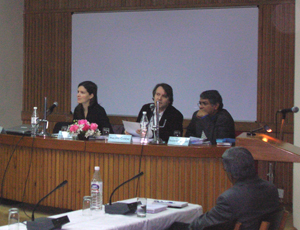Home page > Knowledge Valorisation > National Workshops > Delhi National Workshop 2008 > General issues and objectives of the workshop
General issues and objectives of the workshop
The process of development of metropolitan cities and regions in India, in the context of social and economic changes characteristic of globalisation, raises several challenges. Whereas economic growth with equity was one fundamental objective of the first National Plans, and achieving a more balanced pattern of urban and industrial development the ambition of a series of national programmes, the policy of economic liberalisation and integration in the international market which was launched at the turn of the 1990s tends on the contrary to reinforce economic, social and spatial disparities. This workshop will focus more particularly on the challenge of territorial and social integration and, conversely, the issue of segmented development and social exclusion. These questions will be examined at different scales: national and regional, and at the level of individual metropolises.
 At the regional level, the process of formation of urban and industrial corridors provides an illustration of territorial integration since development trickles down from metropolises to their hinterland. At the national level, however, there is a risk of segmentation if growth is concentrated on these corridors to the expense of other areas. This will be discussed with the case of the development corridor of Mumbai to Delhi (and beyond), including the globalisation process of a regional capital, Jaipur. On the other hand, the creation of Special Economic Zones in the frame of the 2005 Act promotes a pattern of industrial and urban enclaves, of “zones of legal exception”, that generates segregation and spatial segmentation. The role of law and regulations in these processes of spatial transformation and urban development will be given a particular attention.
At the regional level, the process of formation of urban and industrial corridors provides an illustration of territorial integration since development trickles down from metropolises to their hinterland. At the national level, however, there is a risk of segmentation if growth is concentrated on these corridors to the expense of other areas. This will be discussed with the case of the development corridor of Mumbai to Delhi (and beyond), including the globalisation process of a regional capital, Jaipur. On the other hand, the creation of Special Economic Zones in the frame of the 2005 Act promotes a pattern of industrial and urban enclaves, of “zones of legal exception”, that generates segregation and spatial segmentation. The role of law and regulations in these processes of spatial transformation and urban development will be given a particular attention.
At the scale of individual metropolises, the focus will be on the issues of environmental conservation and socio-spatial exclusion, in a context where the process of economic and urban restructuring accentuates social fragmentation. One major challenge faced by Indian metropolises is the access of the poor to decent housing, as demonstrated by the growth of slums. In the metropolitan peripheries and urban margins, the need for housing and the maintenance of greenbelts enter into competition. These conflicts over the use of space echo the debate between proponents of the green agenda (giving priority to ecological issues in the long term) and those of the brown agenda (more concerned with issues of social justice and satisfying the immediate needs of the poor)(1). Thus, the focus on habitat for the poor and environmental protection, along with relative public policies or measures and the intervention of the judiciary, will allow us to contribute towards a more broad-based reflection on the conditions conducive to sustainable “human” development in large metropolises, i.e. a development that takes into account not only environmental considerations, but also social equity. This debate will be illustrated with the case of Mumbai and the Sanjay Gandhi National Park–a protected natural reserve.
The issue of slum will be further addressed by analysing the impact of urban policies and law, including the judiciary. Two main types of slum eradication programmes will be examined, rehabilitation in situ and destruction cum relocation, while giving at the same time a special attention to those slum dwellers who have been or will be evicted without any alternative resettlement option. To what extent do these programmes contribute to the integration of housing and settlements for the poor into the urban territory, or, on the contrary, in which way do they reinforce socio-spatial exclusion of the urban poor? The experiences of Mumbai and Delhi in terms of “treatment” of slums will provide illustrations and matters for discussion.
The challenges faced by metropolitan development in India are not unique; similar issues of territorial integration and socio-spatial exclusion are also at stake in other emerging or developing countries. Hence, the reflections and discussion about the Indian experience can be enriched by a comparative perspective. This will the objective of the last session of this international workshop that will bring to the fore experiences from Brazilian and West-Asian cities, and Chinese Special Economic Zones.
The research papers presented and discussed during this workshop expound findings issued from two joint international projects, one focussing on “Globalisation, Urban Development and Adjustment of Law”, including a comparison between India and the Middle East; and the other on “Social Exclusion, Territories and Urban Policies”, including a comparison between India and Brazil.
Postscript : (1) BARTONE, C., BERNSTEIN, J., LEITMANN, J., EIGEN, J., 1994, Towards environmental strategies for cities, Policy considerations for urban environment management in developing countries, UMP Paper No. 18, World Bank, Washing DC. McGRANAHAN, G. and SATTERTHWAITE, D., 2000, “Environmental health or ecological sustainability? Reconciling the Brown and Green agendas in urban development”, in C. Pugh (ed.), Sustainable cities in developing countries, Earthscan, London, pp.73-90.

